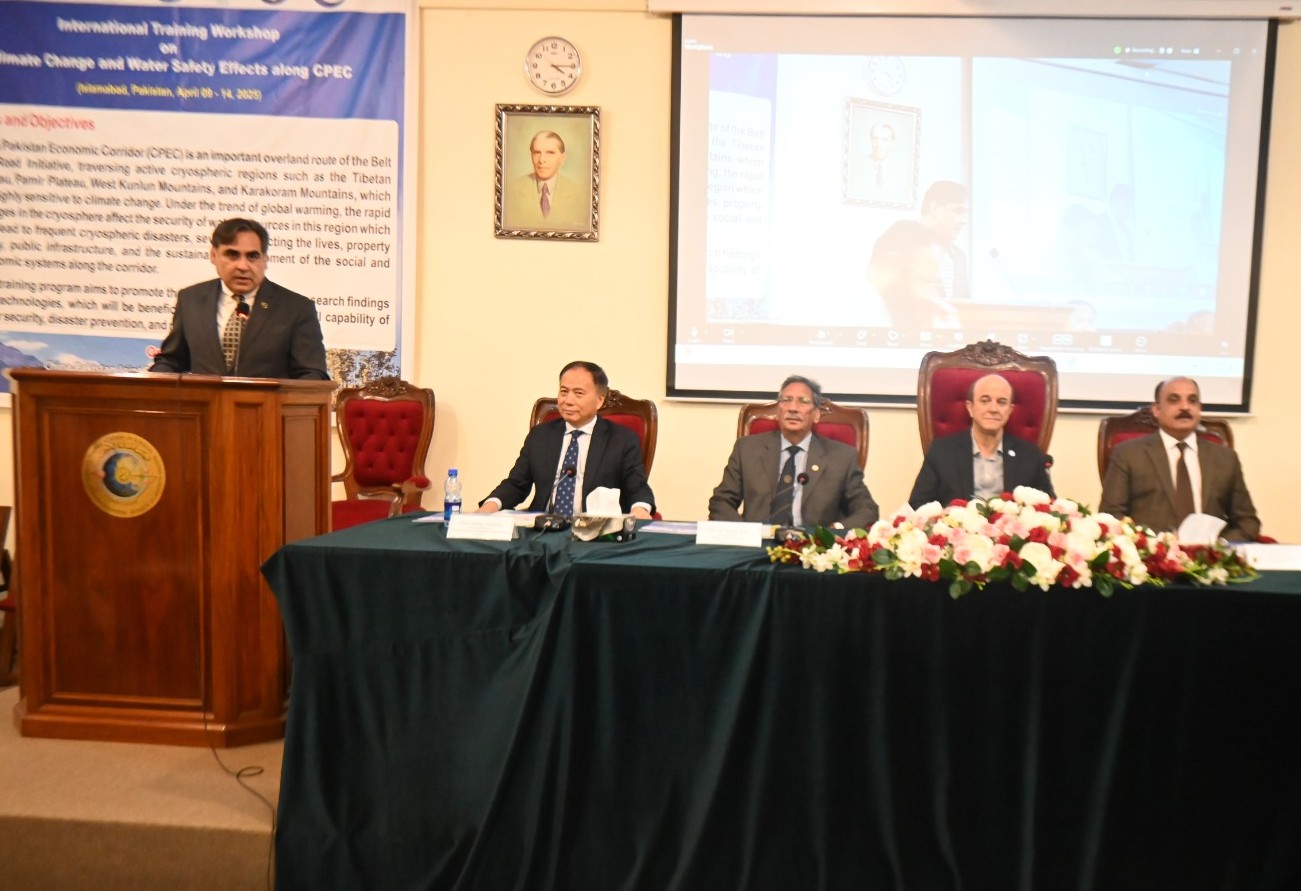International Workshop Addresses Climate and Water Safety Effects along CPEC Pakistan Academy of Sciences, Islamabad | April 10–14, 2025

The International Training Workshop on Climate Change and Water Safety Effects along the China-Pakistan Economic Corridor (CPEC) was concluded here at the Auditorium of the Pakistan Academy of Sciences (PAS), Islamabad on 14 April, 2025. The event was jointly organized by the China-Pakistan Joint Research Center on Earth Sciences (CPJRC) and PAS, with honorable support from the Alliance of National and International Science Organizations (ANSO). The five-day event not only aims to promote the applications of relevant research findings and technologies, which will be beneficial for enhancing the overall capacity of water security, disaster prevention and mitigation in the CPEC region, but will also strengthen the regional cooperation on climate resilience and sustainable governance.
The opening ceremony was officiated by Dr. Zia Ul-Qayyum, Executive Director of Pakistan’s Higher Education Commission (HEC), and Mr. Xu Hangtian, Minister Counselor at the Chinese Embassy. Senior scientists from the Chinese Academy of Sciences, including Prof. Dr. Kang Shichang and Prof. Dr. Su Lijun, joined prominent Pakistani experts such as Prof. Dr. Aslam Baig (H.I., S.I., T.I) and Prof. Dr. Mumtaz Shah, alongside officials from Pakistan Science Foundation, Global Climate Change Impact Study Centre-Islamabad, National Disaster Management Authority, PMAS Arid Agriculture University-Rawalpindi, Pakistan Meteorological Department, and other key national institutions.
In their opening addresses, Dr. Zia ul-Qayyum and Mr. Xu Hangtian highlighted the importance of China-Pakistan cooperation for the academic, technical and socioeconomic welfare of Pakistan. They also addressed the distinctive challenges of Climate Change and its relations with cryosphere, water resources, disaster risk reduction, agriculture and human well-beings and the urgent need to address these challenges through integrated and innovative approaches and advance climate-resilient infrastructure under CPEC to ensure sustainable water management and security. The other speakers of the occasion, namely Prof. Dr. Kang Shichang, Prof. Dr. Su Lijun, Prof. Dr. Aslam Baig and Prof. Dr. Mumtaz Shah also emphasized that the water-related disasters are becoming more frequent and severe; and therefore, the water resources of Pakistan are under serious threat. It was elaborated that the strong friendship between China and Pakistan are important to advancing sustainable development and building a climate-resilient future along the CPEC corridor.
During the training, 11 prominent scholars engaged in cryosphere, water resources and disaster researches from the Northwest Institute of Eco-Environment and Resources, and the Institute of Mountain Hazards and Environment, Chinese Academy of Sciences which are partner and host institutes of CPJRC, as well as from Quaid-i-Azam University, and PMAS Arid Agriculture University-Rawalpindi were invited to present lectures relating on Climate and Cryospheric Changes, Cryospheric Database, Cryospheric disasters, Indus River Basin Water Resources.
At the concluding ceremony of this International Training Workshop, Prof. Dr. Seyed Komail Tayebi (President of ECO Science Foundation), Mr. Tanveer Piracha (Executive Director of National Institute of Disaster Management, NDMA) were invited. They gave positive valuation to this event and they also mentioned that it was a great opportunity for all the participants. They could not only benefit from the lectures but also establish friendships and connections with the lecturers. They should also continuously deepen the scientific and technological cooperation between Chinese and Pakistani scientists in the field of climate change and cryospheric disaster prevention and mitigation. Together with Prof. Dr. Aslam Baig and Prof. Hong Tianhua (Executive Director, CPJRC) presented graduation certificates to all the participants of the training program.
The workshop brings together over 120 professors, academicians and young talents from Pakistan, and 20 delegates from Hindu Kush Himalaya region including China, Nepal, Sri Lanka, Bangladesh, and Afghanistan.

